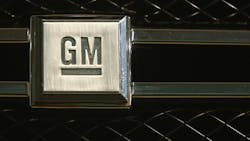GM Puts Pieces in Place to Take on Uber as Cruise, Maven Expand
Ride-hailing apps and car-sharing services have been called existential threats to automakers as we know them, but General Motors Co. is looking to fight fire with fire. Or, in this case, robots with robots.
While the more than a century-old car company’s stock price has stagnated in part because investors view the changing auto technology landscape as perilous, GM has been putting together the pieces needed to compete in the next-big-thing in transportation: the robotaxi.
GM’s Cruise Automation unit has a driverless car it says is ready for mass production. Its Maven car-sharing business is expanding. And U.S. federal regulators just flashed a bright green light to the industry that’s been racing to deploy automated vehicles.
“You can see a world where you have a Maven platform and plug an autonomous vehicle into it,” said Rachel Bhattacharya, Maven’s chief growth officer. “You can see an autonomous future.”
The largest U.S. automaker has the components to someday run its own driverless ride-sharing network, a potentially lucrative growth area at a time when auto sales in its home market are slowing after a record seven-year streak of gains. It remains an open question whether GM actually will follow through in taking on the likes of Uber Technologies Inc. and Lyft Inc., or if supplying and managing the autonomous fleets will be enough of a foray into the transportation of tomorrow to satisfy investors.
GM executives declined to say whether they envision deploying Cruise’s autonomous cars with the unit’s own app, via Maven, or through a partner. But GM is investing heavily in the development of both businesses.
Cruise and Maven
Earlier this week, Cruise showed off the newest version of its autonomous Chevrolet Bolt electric car in San Francisco, saying the technology is ready to be mass produced. A month earlier, Maven announced it was operating in 17 cities and will soon be in eight metro areas with Maven Gig, which rents cars to Uber, Lyft and delivery drivers. By plugging a self-driving Bolt into Maven’s network, GM could mount a challenge to ride-sharing firms consumers already know and use.
“Ride sharing is a proven market with clear advantages” for driverless technology, Cruise CEO Kyle Vogt told reporters Monday, stopping short of saying whether GM will launch its own business. GM bought Cruise last year.
The U.S. Transportation Department eased the path to automakers deploying automated vehicles this week, issuing a new policy that permits companies to self-police the technology’s safety. Transportation secretary Elaine Chao said voluntary guidelines are appropriate to support advances that could reduce the 40,000 traffic fatalities in the country last year and boost the economy by saving fuel and curbing gridlock.
Brand Awareness? Not Good
If it launches its own driverless taxi service, GM will go up against established brands. Uber and Lyft — both of which are pursuing the technology — already have strong name recognition, with at least 80% of people surveyed this year by consultant AlixPartners saying they were aware of each company. The consultant said there was less than 5% brand awareness for other ride-sharing apps, and Maven wasn’t included in the survey.
A separate AlixPartners study found consumers would rather have tech giants such as Alphabet Inc. and Apple Inc. develop self-driving software than carmakers.
GM has 6 million cars using AT&T’s 4G LTE service, and its OnStar telematics unit has been successful for years selling satellite-based navigation, safety and concierge services. But for all the progress it’s made in these areas conducive to competing with ride-hailing apps, GM and its peers have largely missed out on revenue that technology companies have captured from entertainment and navigation services that consumers tap through their smartphones.
“The problem is that GM is not a service company and they never will be,” said Eric Noble, president of consulting for The CarLab in Orange, California. “None of the car companies have proved that they are good at this.”
Some Competing Services
Undaunted, GM has pulled out of big car markets like Europe and India this year, in part to focus resources on mobility and technology.
Several major automakers are also at least dabbling in ride-hailing or car-sharing. Daimler AG’s Car2go business offers Smart and Mercedes-Benz brand models for short-term, one-way rides. BMW AG’s ReachNow app offers a similar service for wheels when you need them. Toyota Motor Corp. owns a small stake in Uber and is working with the ride-share giant. Ford Motor Co. has pledged to have robotaxis ready by 2021 and in the meantime is partnering with Domino’s Pizza Inc. to test appetite for pizza deliveries using autonomous cars.
GM today has about 40 of Cruise’s first-generation self-driving Bolts on the road. The company built 130 units of the second-gen model, which have more computing power and hardware, and 50 of the third-gen cars will be hitting roads in the coming weeks, spokesman Milin Mehta said in an email.
The first-gen models that Cruise developed cost roughly $200,000 each, according to people familiar with the matter, who asked not to be named because GM hasn’t discussed it publicly.
An Either / Or Proposition
Maven, meanwhile, is GM’s way to get a piece of the action as consumer behavior evolves, whether they’re driving for Uber or Lyft or food delivery services like Grubhub. The company is putting more of its Bolt electric cars — the ones that still need a driver — into Maven’s fleet.
Investors have fretted that a consumer exodus away from owning autos as ride-hailing apps take off would be a death knell for carmakers like GM. But with a hand in each bucket, GM executives say they don’t worry if car ownership falls by the wayside.
“I don’t care,” Julia Steyn, Maven’s CEO, said in an interview. “I don’t have to cannibalize one business or the other. We’re attacking whatever business is growing.”
By David Welch
About the Author
Bloomberg
Licensed content from Bloomberg, copyright 2016.
